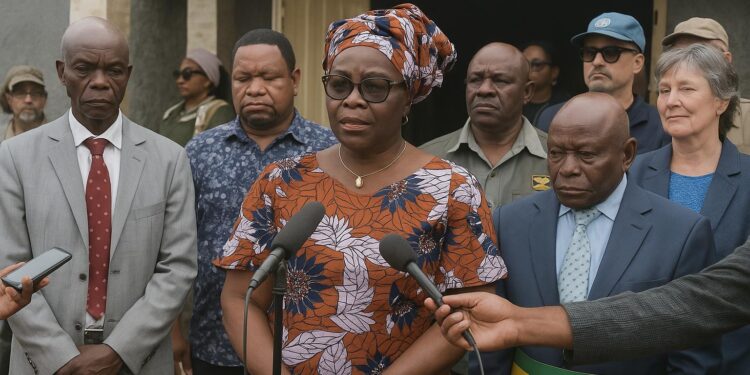Pilot project targets Lekoumou inclusion
On 5 September in the forest village of Moufilou, Minister of Social Affairs Irène Marie-Cécile Mboukou-Kimbatsa inaugurated a 12-to-14-month pilot designed to move indigenous families from subsistence to sustainable livelihoods. Officials estimate that indigenous groups make up 90 percent of the local population, underscoring the site’s strategic relevance.
Why Moufilou was chosen
Moufilou sits in Mayéyé district, Lekoumou department, where limited road links, sparse health posts and low school enrolment expose structural gaps. By demonstrating rapid gains in such a setting, planners hope to establish a credible model for later replication in semi-urban corridors and isolated forest zones.
Telema fund and multilateral support
Financing comes from an additional envelope under the Telema social protection project, with technical backing from the World Food Programme and a Canadian cooperation mission. Telema already supports cash transfers and information systems, allowing the pilot to piggyback on existing procurement and monitoring pipelines.
Legal foundation built in 2011
Congo was the first African nation to enact a dedicated law safeguarding indigenous rights, adopted in 2011. The statute guarantees free birth certificates, equitable school access and health coverage. The Moufilou initiative is framed as an operational extension of those commitments rather than an isolated programme.
Brazzaville Declaration as global benchmark
Momentum accelerated this May when Brazzaville hosted the inaugural World Congress of Indigenous Peoples and Local Communities of Forest Basins. The gathering of more than 500 delegates concluded with the Brazzaville Declaration, encouraging governments to integrate customary land users into climate and development plans.
Education and health pillars
Under the pilot, temporary classrooms will be upgraded, and community health workers trained to deliver maternal services in Teke, Mboshi and French. Officials highlighted the importance of culturally adapted content, noting that language barriers have historically curtailed vaccine uptake and primary completion rates among forest-based families.
Vocational training for self-reliance
Adolescents and young adults will access apprenticeships in carpentry, agro-forestry and eco-tourism. Small starter kits—saws, seedlings and mobile phones—will be distributed following skills certification. The ministry believes that converting traditional knowledge into marketable services offers the quickest route to income diversification.
Income-generating activities
Separate micro-grants will target women’s cooperatives producing cassava flour and non-timber forest products. A revolving financial mechanism is being explored with local microfinance institutions to ensure continuity once grant funding is exhausted, reducing the risk of project-cycle dependency.
Data systems to guide social policy
Social workers will deploy tablets linked to the national social registry, updating household profiles in real time. This will help planners align future budget allocations with evidence on school attendance, vaccination rates and income levels, a step repeatedly recommended by international partners.
Investors eye resilient rural markets
Early field visits by agri-business entrepreneurs have already occurred. They consider organic honey and rattan craft potential export niches once quality control protocols are met. For investors, a functioning social services backbone lowers operational risks and supports labour stability in remote supply chains.
Voices from partners
“Food security is a precondition for learning and earning,” observed a WFP representative at the launch event. A Canadian envoy added that community-driven mapping of needs will remain central, stressing that donor funds are only catalytic and must encourage local ownership from day one.
Timeline and milestones
By December, baseline socio-economic surveys should be finalised. Mid-term reviews in Q2 2024 will assess school retention, vaccination coverage and enterprise survival rates. Final evaluation is slated for the first quarter of 2025, giving policymakers sufficient data before the 2026 budget cycle.
Scaling prospects across Congo
If indicators meet predefined thresholds, the government intends to extend the model to Sangha and Likouala, home to dense forest peoples. Extension would likely be financed through a blend of domestic resources, Climate Fund windows and concessional loans currently under negotiation.
Alignment with SDG agenda
The project advances Sustainable Development Goals on poverty, health, education, gender equality and reduced inequalities. By embedding indigenous priorities within national frameworks, Brazzaville signals that inclusion and growth are mutually reinforcing rather than competing policy choices.












































